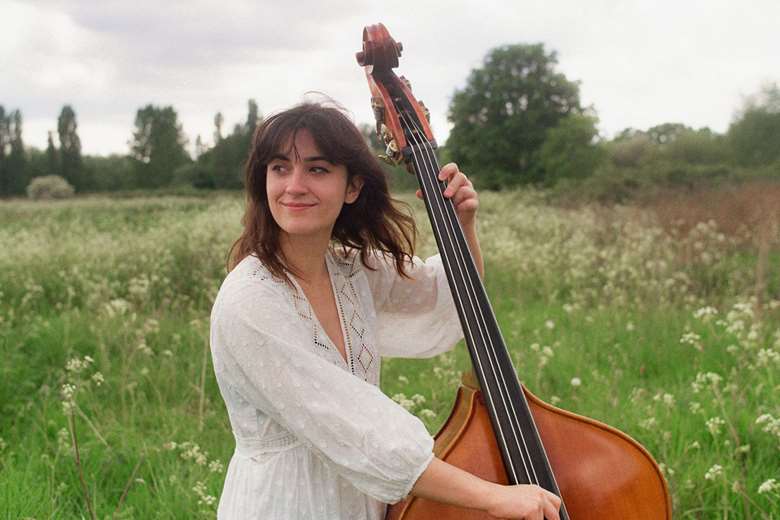Taking Off: Myra Brownbridge
Eddie Myer
Thursday, January 23, 2025
Already an in-demand player across a range of projects, bassist Myra Brownbridge has just released her debut album as a leader, The Voyage Out. Eddie Myer speaks to her about the journey so far

Listen to bassist, composer and singer Myra Brownbridge’s recently-released debut album, The Voyage Out, and you’ll gain an insight into how she presents in person. There’s an unassuming, sunny positivity that engages immediately, but a closer acquaintance reveals a calm but steely determination driving the music forward. The album has already made some influential friends, supported by a select range of gigs at venues like The Vortex and Birmingham’s Spotted Dog.
All Myra’s tunes are very high on 'singability', with the accessible melodies at once rooted and propelled by her gratifyingly fat-toned bass lines. In addition to composing and performing in her own band, she’s in demand as a bassist for a wide array of projects across the fertile cross-cultural scene of young London-based music makers. There’s straightahead work with Tony Kofi’s Generation Monk, alongside a host of more esoteric attractions: duos with harpist Kari Novilla, Asha Parkinson’s genre-crossing Kalpadruma, even depping at Shakespeare’s Globe Theatre.
How did the journey begin?
“I’ve been playing bass since I was about 16," she explains. "I already played guitar and piano but my school jazz band, run by Phil Meadows needed a bassist. Phil was also involved with NYJO London; he really encouraged me to go there. I started on bass guitar, but when I saw Paul Morgan play double bass at the NYJO summer school I immediately got the bug! I saw him years later and told him that he inspired me to take up the bass, and he said ‘I’m sorry’ – typical dry muso humour.
"Lessons with Jane Healey fast-tracked me through classical technique, and I auditioned for The Purcell School. Purcell and Guildhall really helped me get my technique together, since because I’d learnt so quickly there were a lot of gaps in my ability. Then around that time, I started going to Tomorrow’s Warriors Saturday sessions at the South Bank.”
How did Tomorrow’s Warriors compare with your academic studies?
“Those sessions were so important! It was all about community – it felt like a family. I started hanging out and going to a lot of jam sessions in London with my friends Lorenzo and Benjamin, who went on to play with Steamdown. We’d go out to gigs and keep meeting other players from the Warriors community, and it was really encouraging to feel part of such a supportive scene.”
How much is improvisation a part of her music making? I ask.
“I’m think I’m still learning to improvise. It’s the part that’s most challenging. A summer workshop with Midori Takeda and Jakob Bro really helped me – they taught me that improvisation is about surrender, and leaving space – listening and reacting. As a bassist a lot of your improvisation is reactive, in the background. A big experience that really helped me was when I was able to stop worrying about making mistakes. I’ve found from leading workshops that it’s a particular challenge for a lot of young women – it’s hard to get over the social barrier.”
How is it being a young woman in the jazz space?
“There’s a quote from Chimamanda Adichie that says that women are raised to see each other as competition for the attention of men. I think that you can internalise that kind of misogyny – when I was a teenager I had a real aversion to things like all-women bands. It’s been really nice to feel able to let go of that and to embrace working with more women artists – there’s a real need to engage with that narrative of positivity towards welcoming women into the jazz scene. When I was at college a lot of the women dropped out until it was just me and [guitarist] Tara Cunningham, but now I see much more of an even gender split and that feels really good. I like the way that Nikki Iles and Norma Winstone prioritise the music of female composers without making a big deal about it – it helps to normalise.”
I ask about the record: “I wrote it in lockdown thinking about the people in my life that I couldn’t see. I tried to empty my mind and let the melodies come, then added the harmony. As a singer and bass player I find that the melody and the bassline come together – sometimes I’ll try singing a Bach chorale and playing the bass. If the melody and root are strong, the rest will be strong! ‘Icarus’ is the only track with lyrics - I wasn’t ready to be that revealing - but all the music comes from a very personal place. When we recorded I’d try and explain the music to the band in terms of the emotion I wanted, and I’m not sure if Tom [Ollendorff] and Tony [Kofi] were used to working that way! Tony has been so supportive of my growth as a musician – so have Fini Bearman and Josephine Davies.”
Your favourite players?
“Charlie Haden. And Arild Anderson, Thomas Morgan, Skuli Sverrisson. And Ron Carter, Paul Chambers and Ray Brown are the original geniuses.”
What’s coming up next?
“I’m starting a new project with tenorist Nick Wilson and singer/cellist Hoda Jahanpour – exploring the low end! We’re inspired by Lucia Cadotsch, and by the Fred Thomas/ Mischa Mullov-Abbado/ Alice Zawadski trio. And hopefully some European touring with my lovely band – George Garford and Matthew Homes. And there’s a new duo with guitarist Matthew Hurley. So plenty to look forward to!”
Myra’s upcoming gigs include a Duo with Matt Hurley at Pizza Express Holborn on 29 January opening for Ruta Di; and a Trio with Nick Willsher and Hoda Jahanpour at Moustache Bar, Sydenham on 27 February








